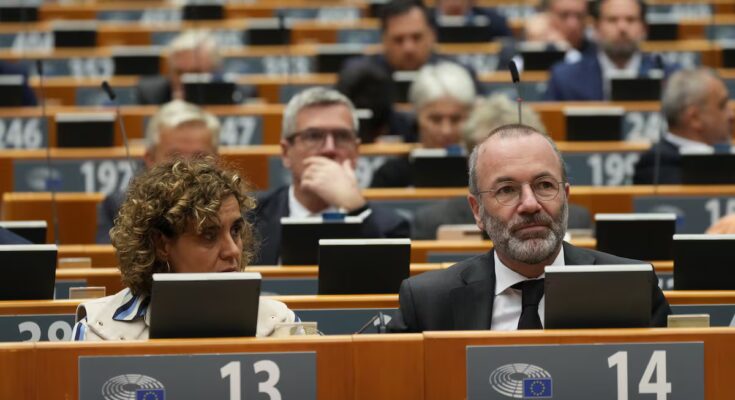The cordon sanitaire was formally buried in the EU this Thursday, when the European People’s Party (EPP) and far-right groups happily consummated their union to pass a legislative measure in the European Parliament, in this case a reduction in sustainability requirements in terms of the environment and respect for human rights for businesses. There have been skirmishes over resolutions and amendments in the past, but this time the marriage reaches the highest level of parliamentary activity.
The fact is, in itself, of great importance. The EPP is already without hesitation a two-faced Janus: it will cooperate with the traditional European majority – social democrats, liberals, greens – but it no longer leaves any doubt that, when it wants, it will resort to the dark side of the Moon. With the sanitary cordon, a political era is buried. It is worth asking whether the EPP – i.e. the supposedly moderate right – will survive this opening of the doors to the ultras.
EPP strategists – with Manfred Weber, its leader in the European Parliament, at the helm – must be clear that this position of the party at the center of two options will benefit it, optimizing the number of policies that can be expressed according to its wishes one way or another. But the lowering of the drawbridge adds to the lowering of the arguments in a way that seems to build piece by piece the monument of the far right’s final victory. The reception of the ultras theses is increasingly broad – in matters of immigration and the environment, above all -, sometimes without nuances, others with almost elusive distinctions.
The phenomenon of erosion has already had serious consequences. The ultras lead the polls in Germany, France, the United Kingdom, Italy and Romania. In the average of European surveys carried out by Political the EPP falls (like the social democrats and liberals) and the ultras rise. If a survey asked European citizens who the leaders of the far right in France, the United Kingdom and Italy are, it is reasonable to think that the degree of precision would be very high: Le Pen, Farage and Meloni. If we asked ourselves who the leaders of the conservatives in those same countries are, we would hear a generalized debacle (they are Bruno Retailleu, Kemi Badenock and Antonio Tajani). The issue may seem anecdotal, but it is symptomatic of a political disease. In these three important European countries, traditional conservatism is in a comatose state due to the push of an extreme right that has managed to marginalize it.
Of course, the DPI is a formidable machine and retains extraordinary power springs and resistance tools. He rules in important countries such as Germany and Poland. But, it should be noted, in both cases, with a firm rejection of the far right and with coalitions with formations of other inspiration.
As if the Weberian burial of the cord wasn’t disturbing enough, the question that led to the burial deepens the concern. A deregulation measure, which is defended as a relief for small businesses, but which was suspiciously a vibrant demand of Trump and Qatar. Reviewing and relaxing regulations is not anathema in itself. Draghi has called for postponing the implementation of the second phase of AI rules until it is clearer what the consequences will be for Europe’s innovation capacity and productivity, and he is probably right. But Thursday’s episode under pressure from Trump does not aspire to be the best perfume in Parisian fashion.
The far right has revealed itself to be a formidable machine capable of creating penetrating emotional states. They construct with greater capacity than other political imaginaries. They need to be deflated, addressing the issues that give them wings – typically the cost of living and illegal immigration – and countering another vision that also has an emotional vibration. Associating with them seems like the perfect recipe to complete your normalization and let yourself be swallowed up. This result would be a democratic tragedy.
Unlike Germany, some exponents of the left bear part of the responsibility because, by refusing to offer government options to the People’s Party – as, indeed, they do with the People’s Party – they throw them into the arms of the ultras as the only viable option for exercising power. But in the case of the European Parliament, the burial is entirely up to the People’s Party, because they have other doors open. We will see if they will survive Adenauer and De Gasperi in a recognizable way, or will end up swallowed up or transmuted.



